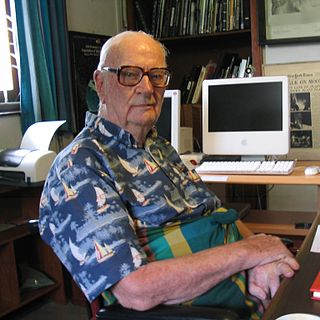
Hard science fiction is a category of science fiction characterized by concern for scientific accuracy and logic. The term was first used in print in 1957 by P. Schuyler Miller in a review of John W. Campbell's Islands of Space in the November issue of Astounding Science Fiction. The complementary term soft science fiction, formed by analogy to hard science fiction, first appeared in the late 1970s. The term is formed by analogy to the popular distinction between the "hard" (natural) and "soft" (social) sciences, although there are examples generally considered as "hard" SF, such as Isaac Asimov's Foundation series, built on mathematical sociology. Science fiction critic Gary Westfahl argues that neither term is part of a rigorous taxonomy; instead they are approximate ways of characterizing stories that reviewers and commentators have found useful.

Jerry Eugene Pournelle was an American polymath: scientist in the area of operations research and human factors research, science fiction writer, essayist, journalist, and one of the first bloggers. In the 1960s and early 1970s, he worked in the aerospace industry, but eventually focused on his writing career. In an obituary in Gizmodo, he is described as "a tireless ambassador for the future."

Laurence van Cott Niven is an American science fiction writer. His best-known works are Ringworld (1970), which received Hugo, Locus, Ditmar, and Nebula awards, and, with Jerry Pournelle, The Mote in God's Eye (1974) and Lucifer's Hammer (1977). The Science Fiction and Fantasy Writers of America named him the 2015 recipient of the Damon Knight Memorial Grand Master Award. His work is primarily hard science fiction, using big science concepts and theoretical physics. It also often includes elements of detective fiction and adventure stories. His fantasy includes the series The Magic Goes Away, rational fantasy dealing with magic as a non-renewable resource.
Writers of the Future (WOTF) is a science fiction and fantasy story contest that was established by L. Ron Hubbard in the early 1980s. A sister contest, Illustrators of the Future, presents awards for science fiction art. Hubbard characterized the contest as a way of "giving back" to the field that had defined his professional writing life. The contest has no entry fee and is the highest-paying contest for amateur science-fiction and fantasy writers. Notable past winners of WOTF include Stephen Baxter, Karen Joy Fowler, James Alan Gardner, Nina Kiriki Hoffman, Jay Lake, Michael H. Payne, Patrick Rothfuss, Robert Reed, Dean Wesley Smith, Sean Williams, Dave Wolverton, Nancy Farmer, and David Zindell.

Dangerous Visions is a science fiction short story anthology edited by American writer Harlan Ellison and illustrated by Leo and Diane Dillon. It was published in 1967.

If was an American science fiction magazine launched in March 1952 by Quinn Publications, owned by James L. Quinn.
Steven Barnes is an American science fiction, fantasy, and mystery writer. He has written novels, short fiction, screen plays for television, scripts for comic books, animation, newspaper copy, and magazine articles.
David Barr Kirtley is an American short story writer and the host of the Geek's Guide to the Galaxy podcast.
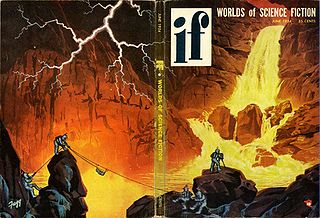
Fictional depictions of Mercury, the innermost planet of the Solar System, have gone through three distinct phases. Before much was known about the planet, it received scant attention. Later, when it was incorrectly believed that it was tidally locked with the Sun creating a permanent dayside and nightside, stories mainly focused on the conditions of the two sides and the narrow region of permanent twilight between. Since that misconception was dispelled in 1965, the planet has again received less attention from fiction writers, and stories have largely concentrated on the harsh environmental conditions that come from the planet's proximity to the Sun.
"The Jigsaw Man" is a science fiction short story by American writer Larry Niven, set in the Known Space universe. The story was first published in Harlan Ellison's anthology Dangerous Visions, and is included in Niven's collections All the Myriad Ways and Tales of Known Space.
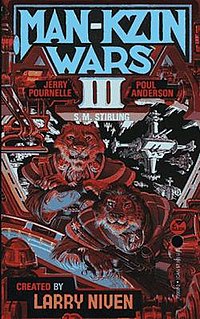
The Man-Kzin Wars is a series of military science fiction anthologies and is the name of the first. The short stories detail the eponymous conflicts between mankind and the Kzinti, set in Larry Niven's Known Space universe. However, Niven himself has written only a small number of the stories; most were written by other science fiction writers, as Niven opened this part of the Known Space to collaboration in the form of a shared universe. The cover art for the books in the series is created by Stephen Hickman.
"The Return of William Proxmire" is a short story by Larry Niven first published in 1989 in the anthology What Might Have Been? Volume 1: Alternate Empires, edited by Gregory Benford.
Stephan Martinière is a French science fiction and fantasy artist as well as cartoonist, concept illustrator and art director.
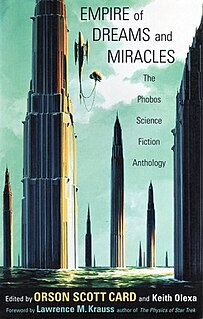
The Phobos Science Fiction Anthology Volume 1 - Empire of Dreams and Miracles (2002) is an anthology edited by Orson Scott Card and Keith Olexa. It contains twelve stories by different writers. All of them were winners of the 1st Annual Phobos Fiction Contest for new writer.
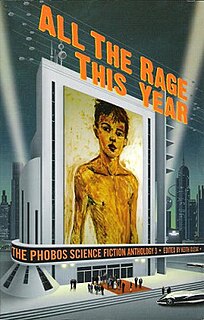
The Phobos Science Fiction Anthology Volume 3 - All the Rage This Year (2004) is an anthology edited by Keith Olexa. It contains twelve stories by different writers. All of them were winners of the 3rd Annual Phobos Fiction Contest for new writer.

Tales of Known Space: The Universe of Larry Niven is a science fiction collection by American writer Larry Niven, collecting thirteen short stories published between 1964 and 1975 along with several essays by Niven and a chronology. This book was collected in Three Books of Known Space.
Alex Hernandez is a Cuban-American science fiction writer based in South Florida. The first of his extensive Cuban family to be born in the United States, Hernandez writes in a genre of his own making, which he calls Transhuman Mambo. According to Hernandez this neologism is based on the popular coupling of a scientific term with a musical form, which accurately describes the combination of his love of science fiction with the Cuban culture of his upbringing. Deeply influenced as a child by the work of Isaac Asimov, Hernandez connected in a personal way to this immigrant whose first language was also not English. Discovering the novels of Octavia E. Butler while in college had an equally profound impact on his writing.

The Best of Larry Niven is a collection of science fiction and fantasy stories written by Larry Niven and edited by Jonathan Strahan, first published in hardcover by Subterranean Press in December 2010. The pieces were originally published between 1965 and 2000 in the magazines The Magazine of Fantasy and Science Fiction, If, Ellery Queen's Mystery Magazine, Galaxy Magazine, Knight, Analog Science Fiction/Science Fact, Vertex: the Magazine of Science Fiction, Isaac Asimov's Science Fiction Magazine, Omni and Playboy, the anthologies Dangerous Visions, Quark/4, Ten Tomorrows, and What Might Have Been? Volume 1: Alternate Empires, the novel The Magic Goes Away, and the collections All the Myriad Ways and The Flight of the Horse.
This is a complete bibliography by American science fiction author Larry Niven:
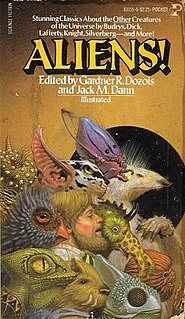
Aliens! is a themed anthology of science fiction short works edited by American writers Gardner Dozois and Jack Dann, the first in a series of themed anthologies. It was first published in paperback by Pocket Books in April 1980. Subsequent volumes in the series were published by Ace Books.












